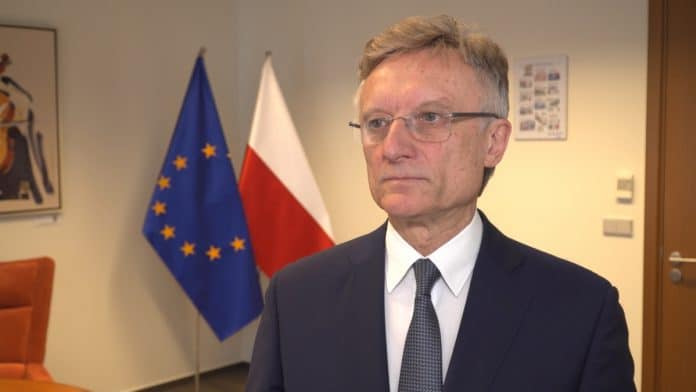1 May marked the 15th anniversary of Poland’s accession to the structures of the European Union. As Marek Prawda, Director of the European Commission Representation in Poland, stresses, at that time it was possible to bridge the development gap and catch up with the richest economies in Europe. The economic effects of Poland’s membership of the EU cannot be overestimated, and the Commission’s data show that since 2003 Poland has also seen a doubling of the wealth of its population. EC research shows that the level of trust in EU institutions and positive attitude towards the European Union in Poland is higher than the European average.
– Over the 15 years of EU membership, we have taken a major step towards catching up with the richest countries on the continent. I think Poland has made good use of this time. Experts believe that thanks to EU membership, we have accelerated this stage of levelling out by 10-12 years. The EU proved to be effective in levelling the standard of living, and Poland is one of the biggest beneficiaries of this process – says the news agency Newseria Biznes Marek Prawda, Director of the European Commission Representation in Poland.
Exactly 15 years ago, on May 1, 2004, Poland became a member of the European Union. It joined the Community structures together with the Czech Republic, Hungary, Estonia, Lithuania, Latvia, Slovakia, Slovenia, Cyprus and Malta. Accession was preceded by lengthy negotiations between several governments and an accession referendum on 7-8 June 2003. 77.45% of voting Poles voted in favour of joining the EU structures (22.55% were against). As a result, then Prime Minister Leszek Miller and Foreign Minister Włodzimierz Cimoszewicz signed the Accession Treaty in Athens on 16 April 2003, pursuant to which the EU was enlarged by 10 countries, including Poland.
Marek Prawda, Director of the European Commission Representation in Poland, stresses that during the 15 years of Poland’s membership in the EU, it was possible to bridge the development gap and catch up with the richest economies in Europe.
– I think that thanks to EU membership, it has also been possible to alleviate the costs of our reforms, which have often been painful and difficult. What is equally important, Poland entered the economic bloodstream of the world and is a participant in production processes and global supply chains – says Marek Prawda.
As part of the cohesion policy and the investment plan for Europe, from 2014 the EU has allocated huge financial resources to help the so-called new ten. They have contributed, among other things, to levelling out differences in the level of development and income, creating attractive conditions for investors and new jobs, and increasing the wealth of the society. The European Commission data show that in the years 2003-2018 the GDP of Poland per capita increased by as much as 100 percent.
The economic effects of Poland’s membership in the EU cannot be overestimated. In the years 2004-2020, the EU will allocate a total of 175 billion euros for investments in Poland under the structural and investment funds (plus 18.3 billion euros from 2014 under the Juncker plan). Poland is the largest beneficiary of EU funds. According to the Institute of Structural Research, since the moment of joining the EU, every year EU spending on structural funds in Poland has been 2-4 times higher than our contribution.
– The scale of emigration may be taken into account on the side of losses. Of course, most of the people who emigrated stayed abroad, so they are apparently satisfied with it, and the country may also benefit from it. However, emigration is a loss of competence and demographics for Poland. Today it is important that we talk about what can be done better or differently – says Marek Prawda – Of course, after these 15 years we have many “prophets of the past” who today think that many things could have been done differently. It is certainly possible to discuss whether the costs of these reforms were properly distributed, whether there are social groups which were affected to a greater extent.
The Director of the European Commission Representation in Poland believes that the most important challenges that the united Europe will have to face in the coming years include, among others, the growing polarisation of society and the strong position of international concerns, which may pose a threat to democracy and freedom.
– The Copyright Directive was recently adopted in the European Parliament and is part of a broader strategy and a tool that will enable us to better control the activities of these corporations. If we do not master this, our world may change. This is one of the main challenges. The second is globalisation, which, as we know, has brought enormous profits and reduced the scale of world hunger, but which has also created new tensions on the other hand. Part of this ‘rich proletariat’ in Western countries has turned into groups that are very open to the manipulation of populists. They see a real worsening of their situation, because Western capital has found opportunities to produce somewhere else for less money. This has created social tensions that Europe has not yet managed to deal with. So social polarisation is another challenge that will affect the Union in the future – says Marek Prawda.
Eurobarometer 90, published in March by the European Commission, shows that more than half of the surveyed Poles perceive the European Union positively and trust the EU parliament. The level of trust in EU institutions and positive attitude towards the European Union in Poland is higher than the European average.
This page has been translated automatically and may contain grammatical errors or inaccuracies. We want this content to be useful to you. If you need a professional translation you can order it here: https://123tlumacz.pl


















